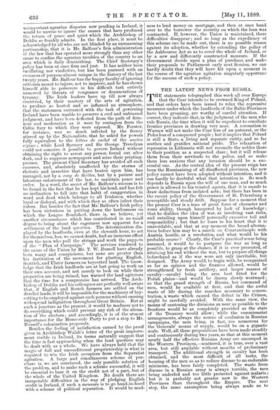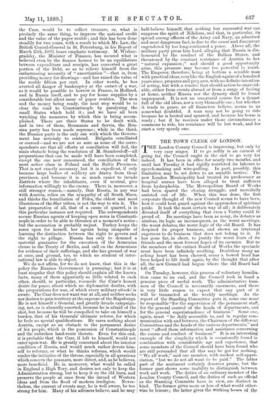THE LATEST NEWS FROM RUSSIA. T HE statements telegraphed this week
all over Europe that the Czar intends to be crowned King of Poland, and that orders have been issued to relax the repressive measures under which the landlords of the Baltic Provinces have been groaning, are worthy of careful attention. If correct, they indicate that, in the judgment of the men who rule Russia, the time when it will be expedient to conciliate frontier provinces is drawing very near. A coronation in Warsaw will not make the Czar less of an autocrat, or the Poles less of a conquered people ; but it implies that Poland is still a State, a living and separate entity, and so far soothes and gratifies national pride. The relaxation of repression in Lithuania will not reconcile the nobles there to their position as a suspected class ; but it will release them from their servitude to the police, and so make them less anxious that any invasion should be a suc- cessful one. As the central idea of the present reign has been the Russianising of all disaffected provinces, the new policy cannot have been adopted without intention, and it can hardly be doubtful what that intention is. So much depends in Russia upon the will of one man, and so much power is allowed to his trusted agents, that it is unsafe to draw deductions from isolated acts ; but there has been in the recent policy of the Government of St. Petersburg a perceptible and steady drift. Suppose for a moment that the present Czar is a man of great force of character and some ability, though hampered by lack of knowledge ; that he dislikes the idea of war, as involving vast risks, and entailing upon himself personally excessive toil and responsibility ; but that he fears in his heart that it is unavoidable, and that at any moment the broad alterna- tives before him may be a march on Constantinople with Austria hostile, or a revolution, and what would be his probable course ? Clearly, the Czar's practical sense being assumed, it would be to postpone the war as long as possible, to grasp at the chance, if it is ever presented, of attaining his end without the war, but to prepare all things beforehand as if the war were not only inevitable, but designed. The Army would, to begin with, be reorganised as far as opinion and the finances allowed, would be strengthened by fresh artillery, and larger masses of cavalry—cavalry being the arm best fitted for the Polish plains—and would be drawn slowly westward ; so that the grand strength of Russia, her command of men, would be available at first, and that the awful waste of life during the marches necessary to concen- tration, a waste which caused the defeat in the Crimea, might be carefully avoided. With the same view, the means of cantoning the divisions as near as possible to the frontiers would be as completely provided as the state of the Treasury would allow ; while the commissariat arrangements, always the source of confusion in Russian campaigns, the men being, in fact, too numerous for the Generals' means of supply, would be on a gigantic scale. Well, all these preparations have been made steadily and continuously during two years, so that at this moment nearly half the effective Russian Army are encamped in the Western Provinces,—scattered, it is true, over a vast area, but still available without months of preliminary transport. The additional strength in cavalry has been obtained, and the most difficult of all tasks, the housing of the men so as to reduce disease to an endurable minimum, has been fairly completed. The waste from disease in a Russian army is always terrible, the men being underfed and too little protected against malaria ; but it is probably not greater now in the Western Provinces than throughout the Empire. The next step, the same assumption being always made as to the Czar, would be to collect treasure, or, what is precisely the same thing, to improve the national credit and the value of the paper rouble ; and this has been done steadily for two years, with a result to which Mr. Law, the British Consul-General in St. Petersburg, in his Report of March 25th, 1889, bears emphatic testimony. M. Wishne- gradsky, the Minister of Finance, has secured what is believed even by the finance houses to be an equilibrium between expenditure and receipts, has converted a great portion of the Debt, so as to relieve himself from the embarrassing necessity of " amortisation "—that is, from providing money for drawings—and has raised the value of the rouble fifteen per cent. In other words, he has averted all danger of bankruptcy at the outset of a war, as it would be possible to borrow in France, in Holland, and in Russia itself, and to pay for home supplies by a considerable but silent issue of paper roubles. The men and the money being ready, the next step would be to clear the road to Constantinople by paralysing the small States which hold it ; and we have all been watching the measures by which this is being accom- plished. There are three States to be dealt with, and in two of them, Roumania and Servia, the Rus- sian party has been made supreme ; while in the third, the Russian party is the only one with which the Govern- ment has seriously to contend. Bulgaria conciliated or coerced—and we are not so sure as some of the corre- spondents are that all efforts at conciliation will fail, the main obstacle being the resolution of M. Stambouloff—all preparations that can be made will have been completed, except the one now announced, the conciliation of the most active class in Poland and the Baltic Provinces. That is not exactly necessary, but it is expedient, if only because large bodies of soldiery are drawn from those provinces, and because it is so much easier to invade districts where the inhabitants, even if neutral, give information willingly to the enemy. There is, moreover, a still stronger reason,—namely, that Russia, in any war with Austria, relies on the sympathy of all South Slays, and thinks the humiliation of Poles, the oldest and most illustrious of the Slav tribes, is not the way to win it. The last preparation of all, that of a cause of quarrel, is in this particular instance not required. The correspondents accuse Russian agents of keeping open sores in Constanti- nople in order to be able to threaten at a moment's notice ; but the accusation is probably unjust. Turkey keeps the sores open for herself, her agents being incapable of learning the distinction between the right to govern and the right to pillage. Russia has only to demand a material guarantee for the execution of the Armenian clause in the Treaty of Berlin, and call on the Armenians for evidence of their sufferings, and she has ground of war at once, and ground, too, to which no student of inter- national law is able to object.
We do not affirm, for we do not know, that this is the policy the Russian Government is pursuing; but it is at least singular that this policy should explain all the known facts, many of them apparently so little related to each other, should, in particular, reconcile the Czar's honest desire for peace, about which no diplomatist doubts, with the preparations for war, of which every military attaché is aware. The Czar does not want war at all, and neither seeks nor desires to gain territory at the expense of the Hapsburgs. He is not himself a General, and greatly dreads campaign- ing, not, as is absurdly asserted, because he is afraid of the shot, but because he will be compelled to take on himself a burden, that of his Generals' ultimate referee, for which he feels no special qualifications. He cares nothing about Austria, except as an obstacle to the permanent desire of his people, which is the possession of Constantinople and the unbroken land-route thereto. Even for this end, it is probable that the Czar, if left to himself, would not enter upon war. He is greatly concerned about the interior condition of Russia, and would much rather devote him- self to reforms, or what he thinks reforms, which would render the initiative of the throne, especially in all questions which concern the peasants, more direct, and, as he believes, more beneficial. He is, moreover, what would be called in England a High Tory, and desires not only to keep the Administration strong, but to keep it on the old lines, and preserve the people at once from the inroad of Western ideas and from the flood of modern irreligion. Never- theless, the current of events may, he is well aware, be too strong for him. Many of his advisers believe, and he may half-believe himself, that nothing but successful war can suppress the spirit of Nihilism, and that, in particular, its spread among officers of the Army and Navy, an admitted and most dangerous fact, is due to the ennui and discontent engendered by too long-continued a peace. Above all, the military party press him hard, alleging that Russia is dis- honoured by the conduct of the Balkan States, and threatened by the constant resistance of Austria to her "natural expansion ;" and should a good opportunity arise, this pressure may become too powerful to resist. The Emperor, therefore, being at bottom a sensible man with practical ideas, very like the English squire of a hundred years since, prepares and prepares, with no definite intention of acting, but with a resolve that should action be unavoid- able, either from events abroad or from a surge of feeling at home, neither Russia nor the dynasty shall be found unprepared. It is not an unnatural course for a dynast full of the old ideas, nor a very blameable one ; but whether it tends to peace, as all financiers believe, seems to us somewhat doubtful. A man may not be going to ride because he is booted and spurred, and because his horse is ready ; but if he receives under those circumstances a summons to ride, his resistance will be but weak, and his start a very speedy one.







































 Previous page
Previous page